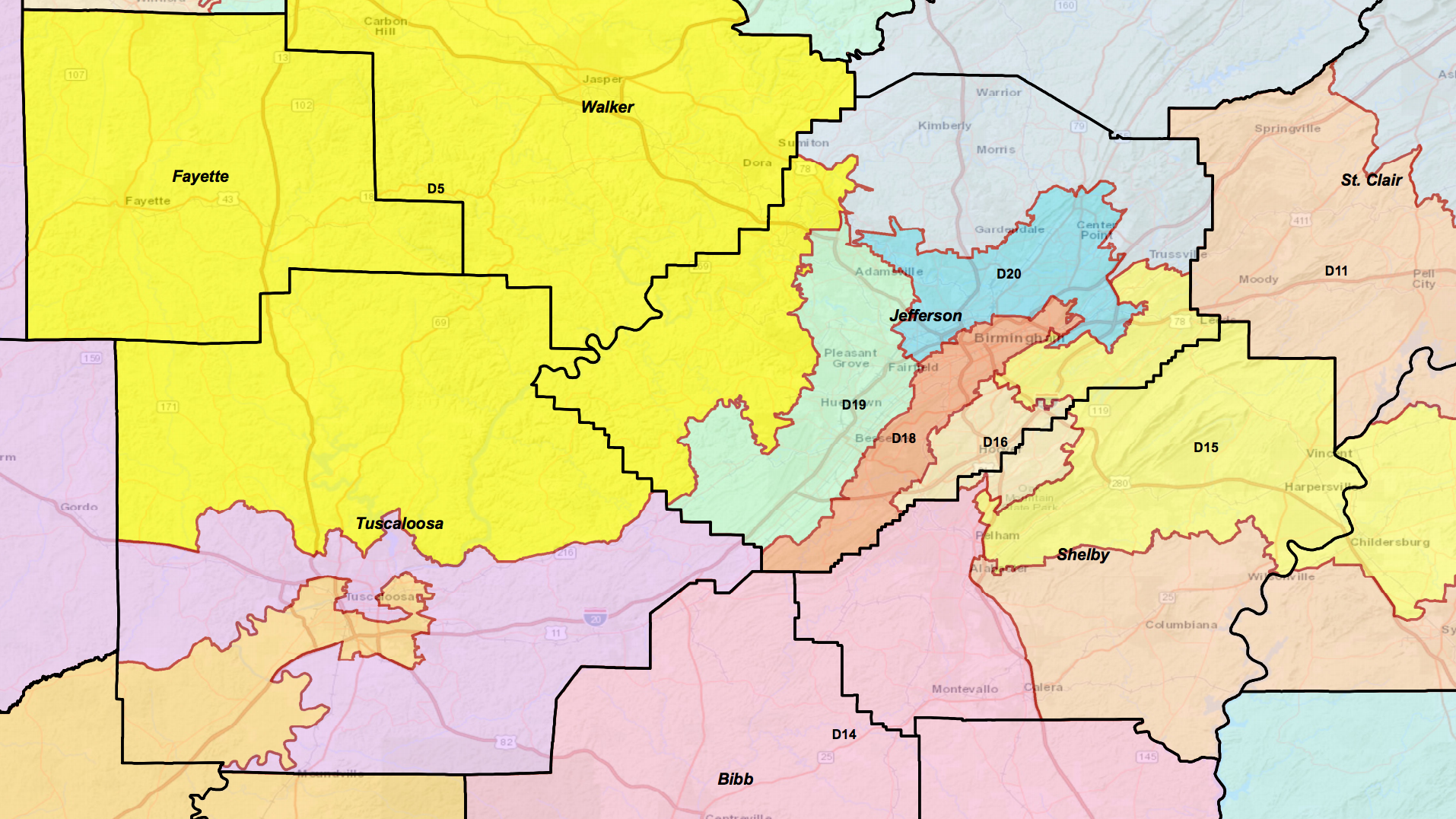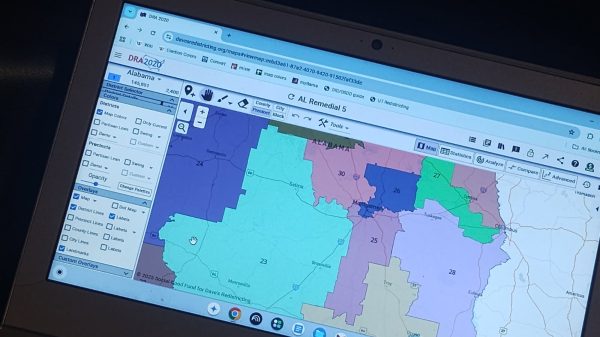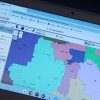By Chip Brownlee
Alabama Political Reporter
MONTGOMERY — After almost 16 hours of bill reading and filibustering over two legislative days, House Republicans pushed through their redistricting plan against the wishes of Democrats who said the plan doesn’t fix gerrymandering problems.
The plan passed 70-30 after Democrats had the 530-page bill read at length by a robotic reading machine.
The GOP plan would change or shift about 70 House legislative districts to comply with a January Federal court decision that ruled 9 House districts unconstitutional. Democrats were amenable to a majority of the changes, but there was intense disagreement over the dividing of Jefferson County and the makeup of its county delegation.
Democrats say the House plan keeps the Jefferson County delegation under Republican control when in fact the county should have equal representation or a Democratic majority based on its voting preferences. There’s currently a 10-8 Republican to Democrat split in the county delegation, when the county often votes with Democratic majorities.
The new GOP House plan would reduce that to a 9-8 split by cutting one Republican out of the county entirely, if historical voting tendencies continue, but Democrats prefer parity. They want another Republican, Rep. Tim Wadsworth, R-Arley, cut out of the county to leave the delegation with an 8-8 split.
Wadsworth’s district covers largely Walker and Winston counties but slides into a sliver of northwest Jefferson County, leaving the county delegation in favor of the Republicans. A minority of his constituents are within Jefferson County lines.
Control over the county delegation gives Republicans wide-ranging control over local legislation, which affect many local issues and are normally voted on only by the county delegation.
“They come in and vote our local legislation down,” said Rep. Mary Moore, D-Birmingham. “We have more than enough people in Jefferson County to represent Jefferson County without drawing people in from other counties, three counties away, who can’t even relate to the culture.”
Democrats first made a motion Tuesday to have the bill read at length, a delay tactic that slows down progress in the chamber even when the majority votes to cloture. The motion came after Republicans voted to end debate on the bill.
No other legislation can move while the full bill is read. The process ended up eating almost two legislative days as the session nears its end. Republicans were irritated with the Democrats’ tactics, but the minority felt they had no other option.
“If you were in that situation and did not have a voice, you would use every tool you had to try to get your message out,” Moore said. “We used the tools we had to try to get the message out.”
In total, more than 95 legislative districts — about 70 in the House and 25 in the Senate — would be redrawn if the GOP Senate and House plans pass the Legislature. Most of the changes are minor, both sponsors have said; many of the realignments are intended to bring districts back in line with precinct and county lines where possible.
Republican committee chair, Rep. Randy Davis, R-Daphne, said he couldn’t work out legislative parity in Jefferson County without shifting other districts that were untouched even by the broad House plan, which would cause a ripple effect across the State.
Democrats presented two of their own plans but neither made it to a vote in committee.
The federal court decision earlier this year ruled 12 of Alabama’s Legislative Districts unconstitutional because the court found their alignment had been based improperly upon race. Three of the districts were Senate districts and nine were in the House.
Republicans, who drew the lines in 2010, said they were trying to maintain majority-black districts in order to comply with the Voting Rights Act. But several Supreme Court decisions, including Shelby County v. Holder in 2013, struck down many of the racial requirements for redistricting.
The Black Caucus, who challenged the lines, successfully argued in Federal court that the GOP packed black voters, who often support Democrats, into a handful of districts to limit the Democrats’ power. Now the Legislature is largely drawing lines without considering race, then they will go back and see if any majority-minority districts’ demographics would be changed too dramatically.
Passing the Senate plan took almost a full legislative day, and the House plan took two. With only four legislative days left in the 2017 session and a looming May 25 deadline to get the plans back to the federal court, lawmakers are in a hurry to finalize a plan and get it to the Governor.
“We know we are going back to court,” said Rep. Randy Davis, R-Daphne, the House redistricting committee chair. “We think we are addressing it in a very fair and forthright way.”
Rep. John Knight, the Black Caucus chair, and Rep. John Rogers, D-Birmingham, said they expect the responsibility of redistricting the state to end up in the hands of the federal courts because they believe the Republican plan does not solve the issues raised by the courts.
The plan, if passed by the Legislature this session, must be approved by the federal courts regardless before going into effect.
“It’s not fun sitting in here reading where you’re not being productive,” Knight said. “We’d rather be productive, but the only thing we were asking for is fairness. You have just a few people from one little area basically tie up this whole Legislature. So you might as well not have representation from across this state.”
The bill will now head to the Senate, where it could cause a similar delay. The Senate redistricting plan passed last week after a similar disagreement over the Jefferson County Senate delegation killed a day; it now awaits action in the House. Both chambers could go through another round of filibustering and delays as they consider the two plans.
The session will draw to a close next week, which will be the Legislature’s last opportunity to have input on redistricting. The Federal court directed new maps be in place in time for the 2018 statewide general election. If the Legislature doesn’t come to an agreement, the court will likely do it themselves.
Email Chip Brownlee at [email protected] or follow him on Twitter.





















































